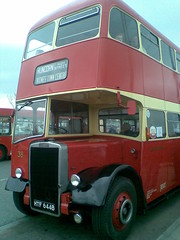"The local-authority bus service became the poor relation of the council's operations. It was bottom of the queue for investment in new fleets and it was at the whim of councillors' postbags. Bus routes became more and more complex as they adapted to meet the idiosyncrasies of individual voters' angry letters. Routes became slower and less attractive to passengers, who opted more and more for the car. The bus manager had little clout over the provision of bus priority measures and also had to battle for the sort of innovations and changes that any other manager would take for granted."
So says First Group, the FTSE-100 PLC who began life as Aberdeen Corporation Transport and is now the largest bus operator in both the UK and North America. They have a point – if you could choose one good thing about bus deregulation it would be the ability for companies to grow their business through marketing and quality customer service. If a timetable can be improved, the changes can be registered with the authorities and implemented within 56 days. No need for a lengthy inquiry: the operator is in charge. (Although try not to abuse that power – customer surveys prove one thing time and time again, that passengers crave stability and don't care much for changes!)
What First fail to take into account in their quest for growth is the sentimentality and loyalty inherent towards the local corporation bus company. I spent yesterday in Widnes, where Halton Transport was celebrating its centenary by putting on a family fun day, highlight of which were free rides over the Silver Jubilee Bridge on double decker buses from yesteryear. There was a diverse range of people enjoying the festivities, old and young alike. Private companies often look to their heritage too, and there are many employees who take great pride in their work. But affection for a PLC from ordinary customers? Probably not – unlike a municipal operator, where everyone who pays council tax is in essence a shareholder.
It's not just civic pride that lends itself to affection for the corpies. There's a great deal of social history at work. Generations of ordinary working people have spent their lives on the local transport system, either working or travelling. The bus company is part of the fabric of local life. I remember from my own Warrington childhood that on returning from a week in a caravan in North Wales, you wouldn't feel like you were home until you saw a local red-and-white bus, coat-of-arms and all. A touch of individuality in an otherwise homogenous, corporately branded high street.
Given the affection for the locally run, locally owned bus company, it comes as a surprise to me when councils decide to sell their assets. Many towns across the country would dearly love to have more say over bus provision, so why give up something so easily? The latest municipal under threat is Rossendale Transport, where the council is to "test the market to ascertain the interest" in the company. Perhaps the council can only see a big lump sum at a time of increasing pressure on council finances, yet the company doesn't cost the council any money; provides a modest annual dividend that can be put towards other public services; and runs bus services at a lower margin than the PLC companies, which translates to a more extensive network of services requiring less public subsidy (paid for by council taxes) than might otherwise be the case. It's a no-brainer: don't sell off the family silver.
But for all these benefits when it comes to the public purse, the modern municipal should definately not be considered as running unattractive services with no entrepreneurial flair. Today they consistently punch above their weight in the quality stakes: Nottingham, Lothian and Warrington have all been crowned UK Bus Operator of the Year in the past decade, with many others making the shortlist. My tip for this year: keep an eye out on Reading, yet another municipal. Number of First bus companies winning this award over the past decade: zero.

1 comment:
Note to self: family silver and family jewels are not synonymous phrases :)
Post a Comment